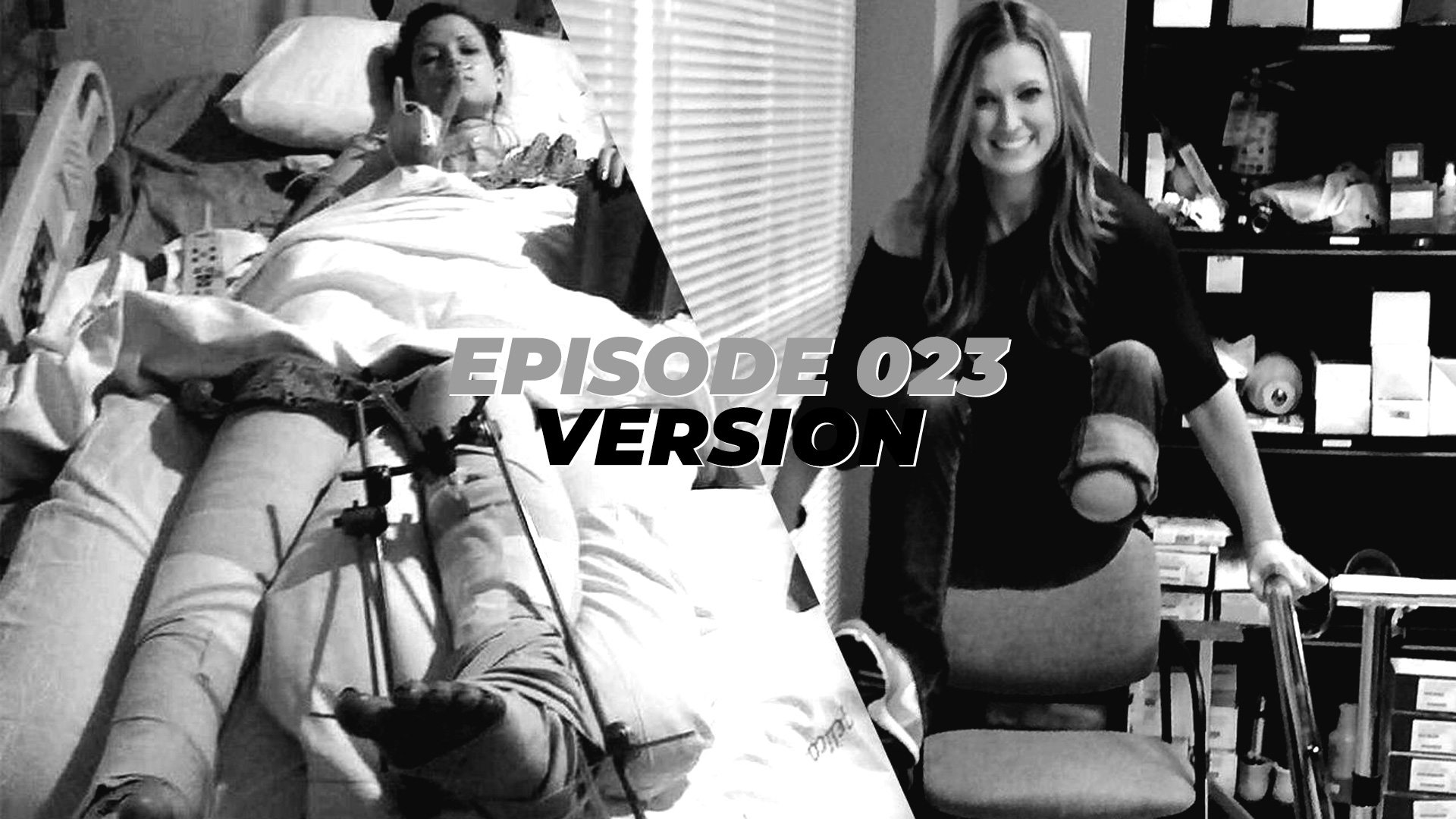Rebekah Gregory DiMartino was standing with her family near the finish line of the Boston Marathon on April 15, 2013, when two bombs exploded, killing three people and injuring more than 260 others. Her injuries were catastrophic, resulting in more than 35 surgeries and, eventually, the amputation of her left leg.
Two years later, she trained to run the Boston Marathon on a prosthetic leg. Through pictures and her own words, she talks about her journey, starting with that fateful day at the finish line.

April 15, 2013: Marathon Day
It was the weekend of my 26th birthday, and my husband Pete’s mother, Mona DiMartino, was running the Boston marathon. Pete and I had taken my son, Noah, who was five then, up to Boston to watch a Red Sox game and do some touristy stuff in the city. We were going to watch Mona run, then head back home to Houston right after she finished.
We were standing there on the marathon route, cheering at the 17th-mile mark with signs. We were excited, and the crowd was insane. There were people everywhere, cheering and clapping for the runners. We wanted to get a better view, so we went down to Boylston Street, right there at the finish line.
That’s where we were when the first bomb went off.
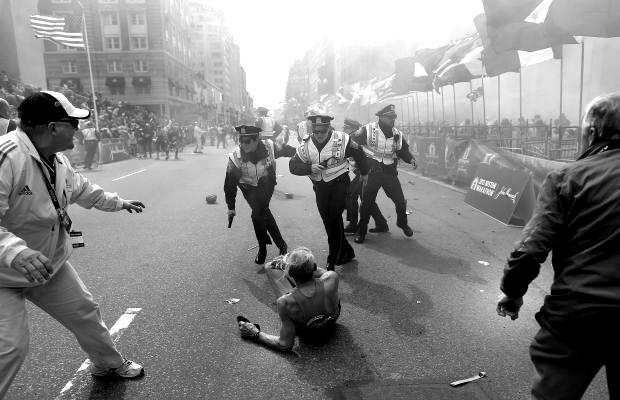
I remember everything, and I still think about it when I close my eyes at night. I was thrown back, and hoisted into the air before landing, hard. It was almost like my own personal horror movie, and I was the star of it. Everything was almost in slow motion, and it was gray and smoky. You could see pools of blood on the ground and there was flesh and bones and body parts strewn everywhere.
I looked down at my legs and I didn’t see them because they were so badly mangled.
I couldn’t lift anything but my head up. My immediate, panicked reaction was, “Where is Noah? Where is my baby?” He had been sitting at my feet right when it happened.
I could hear only faint voices because my eardrums were blown out, but I somehow still heard Noah’s scream. He was in back of me, but when I lifted my arm to try to pull him toward me I realized that my hand wouldn’t be able to do it.
They said my body acted as a human shield and Noah, as a result of that, had just a cut to his bone on his right leg and a few minor injuries. Pete was going to be OK, too, though he had a nearly severed Achilles and severe burns.
I was in much worse shape. I remember emergency workers loading me up in the ambulance. I could see them say, “We have an amputee,” but I was reading their lips because I couldn’t hear. I knew then that if I did make it, I was not going to make it with my legs.
I got to the hospital and they rushed me into emergency surgery and put me into a medically induced coma.
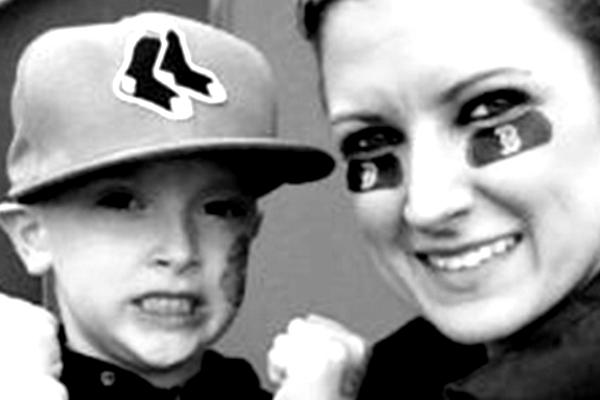
April 20, 2013: Awake
About a week later, I was awake and mostly coherent. My mom had to actually take a picture of my legs to let me know that they were still there, because I didn’t believe her. I thought they were gone.
I was very, very sick, and injured in so many places that I was constantly in surgery during the 56 days I was in two different hospitals.
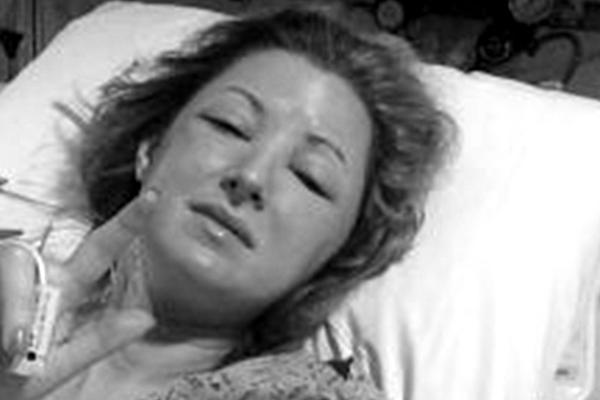
June 11, 2013: Still Life
I was finally out of the hospital, but I didn’t have any mobility at all, and my weight had dropped to 79 pounds from my hospital stay. During one of the surgeries they had taken muscles and blood vessels from my left thigh and put them into my left foot where there was a huge hole. Because of that, I had to lie for months with my foot elevated, and could only put it down for about five minutes every hour. I was also on IV antibiotics, so I was bedridden.
It was very depressing. You’re used to being so active, and it was just like my world stopped. But I couldn’t give up, because I had to be there for Noah. I was willing to do whatever it took to get through it all. I was at my mom’s house, and she did everything for me. And I mean everything, even helping me dress and bathe.
There was one memorable day, four months after I had been out of the hospital, when I could move around a little bit and decided to take a bath by myself. But in order to take a bath, you have to be able to take your pants off, and I still couldn’t do that. I looked for scissors to cut them off, but I was completely out of luck. And that left me … sitting fully clothed in a freaking bath tub.
Nov. 9, 2014: The Breakup
I think I always knew that I wasn’t going to be able to keep my leg. It’s just something that you have an instinct about, because I was still so limited in what I could do, more than a year and a half after the bombing. But I trusted that the doctors knew a lot more than I did, and they wanted to try certain things, so I told them, OK, let’s try it. When it got to the point where I’d had 17 surgeries on my left lower leg, I felt like it was kind of silly to hold on to something when it was only holding me back. My leg felt like a bad boyfriend — something that I needed to cut out of my life because it was doing nothing but keeping me from where I needed to be. So I scheduled an amputation, and wrote my leg a breakup letter:
Hey it’s me.
I’m sure it won’t come as a shock to you when I say that we’ve grown apart. The love that we once had has dwindled, and this relationship has become a real burden on my life. We have been through a lot together. We have seen a lot of places, done a lot of things, and you have helped me through some of the toughest steps thus far.
I promise to always treasure that. And I’m not saying this isn’t hard for me. It is. But as tough as it may be, I feel like our time together has come to an end. I need to feel every day that by having a relationship with you, I am becoming a better person. And for a long while now, I haven’t felt like that. Instead, I feel like you are holding me back from really reaching my full potential.
Now I get this is probably pretty tough to hear me say, but I have never lied to you and I don’t plan to start now. What I need is something you can’t give me anymore. And the empathy that you require, I can no longer handle. I love you. I really do. But I think I need to start on the next leg of my journey. So with that said, I have enclosed a gift certificate that I hope you will use. Go get yourself one last pedicure on me and enjoy it because tomorrow … I will be cutting you out of my life for good.
Wishing you the best wherever you end up,
Rebekah
I also decided at this point that I would run the 2015 Boston Marathon on my new prosthetic leg. I began working with my trainer, Artis Thompson, who is also a below-the-knee amputee. He knows exactly how much to push, and we began doing strength and endurance exercises like squats on one leg and balancing. (I can balance on my right leg for 40 minutes at a time now!). I’d tell people this goal and they’d call me crazy for even trying, but I needed a goal, and this is what I wanted to do.
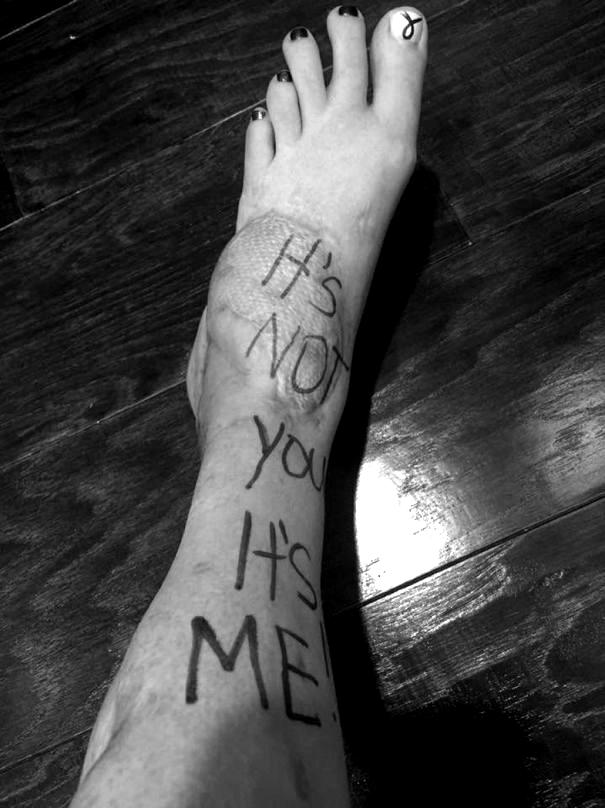
Nov. 10, 2014: Amputation Day
On amputation day, I thought I’d be scared, but I was just so excited. I’d done a lot of research and I felt so hopeful. When I woke up after, I thought I’d freak out that my leg was gone, but it was really such a huge burden off of me, and I couldn’t be anything but thankful for it. I had been in limbo for such a long time and in so much pain. Already, even immediately after, I was in less pain than I’d been in the entire year and a half before.
Jan. 7, 2015: Felicia Is Born
I decided my prosthetic leg was a new addition to my family, and I wanted to treat it that way and celebrate it, so I put out this formal birth announcement. She was 4 pounds, 8 ounces and 18 inches long. And yes, the labor was excruciatingly long! I named her Felicia because of the movie “Friday,” where they say, “Bye Felicia.” I had recently seen an e-card that said, “I wish I had Felicia’s life… Always going somewhere.” I thought it was perfect because I knew once I got used to her, she’d always be going somewhere and no one would be able to keep up.
I don’t know what I expected, but it was very hard to walk. It feels like a weight that’s attached to your knee, and you’re grinding your knee into a really hard surface all day long. It’s very uncomfortable and really weird, but they say it will toughen up and I’ll be able to endure more. Walking is much more painful than I ever thought it would be, though.
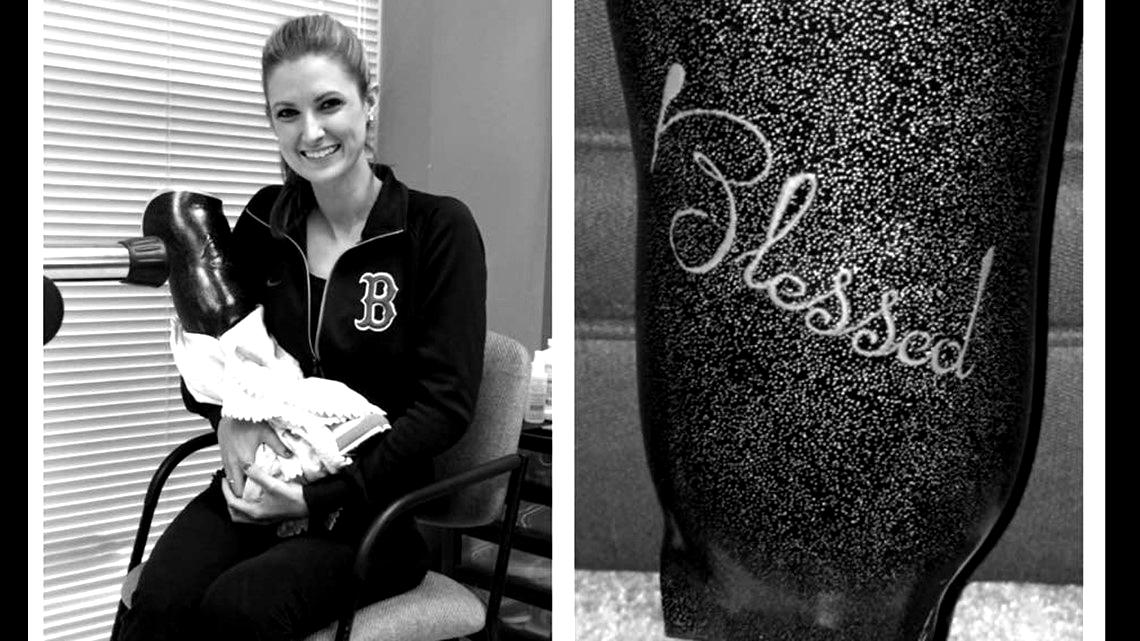
Jan. 21, 2015: Learning To Run
I still have to pinch myself that this actually happened. When I went to my rehab appointment that day, I had no idea that they would allow me to jog a little bit. I had developed a really bad blister where the prosthetic rubs the leg, and I thought I’d have to stay off of it, but the next thing I know I’m running down the hallway!
Running is very hard to do, and it’s something I’m not used to. It feels like I’m dragging something along with me. But the feeling of running – even just that tiny little jog down the hallway — was the greatest feeling ever. I’ve come so far!
Feb. 10, 2015: Heading Back To Boston
Right now, I go to the gym for 2½ hours a day and also do an hour of rehab. So half of every day is training for this marathon. I’m learning how to walk and learning how to run at the same time. My doctor told me that I’m way ahead of schedule, and the stuff that I’m doing right now usually takes people six months to do, so that gives me hope.
I’ve never been a runner. I actually tried to run a half marathon a few years ago before this and I hated every minute of it. I didn’t understand why people would run, especially for fun. But the marathon is a huge part of my life now, and it will always be.
I got blown up and they tried to destroy me. This is my way of showing everyone that they didn’t destroy me, and I’ve come back stronger because of it.
Rebekah Gregory DiMartino, as told to Amy Van Deusen February 2015
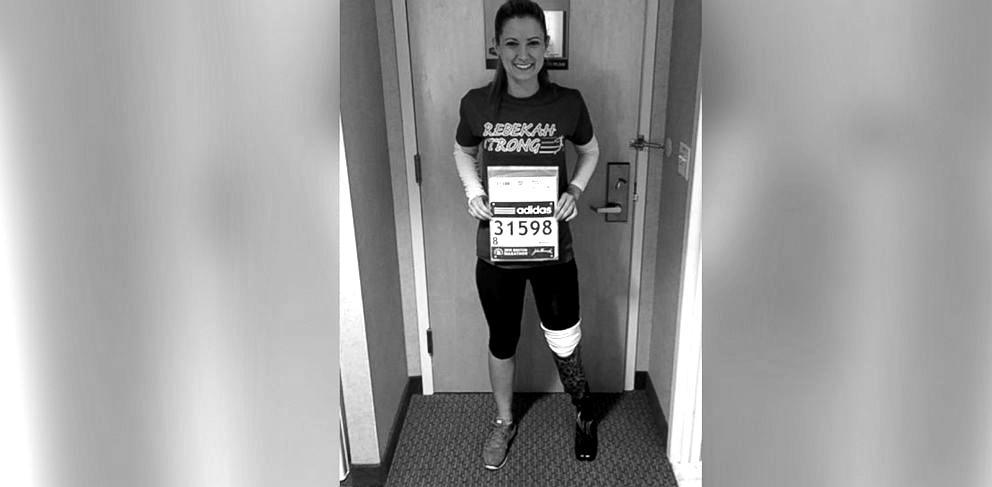

INFLUNSR defines grit as choosing passion over distraction. Passion begins with intrinsically enjoying what you do. Interest doesn’t mean that you enjoy every part. One form of perseverance is the daily discipline of trying to do things better than we did yesterday. I met a guy recently who said he was writing a book. When I asked about how much he had done, it turned out after a bit of mumbling and waffling around, that he wrote one chapter 12 months ago and hadn’t touched it since. That’s not what we are talking about when we say gritty people practice. Gritty people continue to find their weaknesses and zero in on them to eliminate them. What ripens passion is the conviction that your work matters. For most people, interest without purpose is nearly impossible to sustain for a lifetime. If you don’t think what you’re interested in matters you won’t keep going when it gets hard. If you don’t get deep personal satisfaction from the results of your interest, you won’t jump the hurdles that get put in front of you. You need to find your purpose if you want to keep going.
And then there is hope. That is what Rebekah Gregory DiMartino exhibits most. From the very beginning to the very end, it is inestimably important to learn to keep going even when things are difficult, even when we have doubts. At various points, in big ways and small, we get knocked down. If we stay down, grit loses. If we get up, grit prevails.
What does it mean when Solomon says hope deferred makes the heart sick (Proverbs 13:12)?
No one likes waiting. It feels good to get what we want. But when our expectations are delayed for a long time, we can experience disappointment, disillusionment, and loss of hope. In some cases, prolonged waiting for what we eagerly desire can become such an affliction to us that it differs little from a lingering sickness. This scenario is the exact meaning of Solomon’s words “hope deferred makes the heart sick.”
The term deferred in the passage means “to put off” or “drag out,” as in a long, drawn-out process. As we eagerly hope for something important, and it keeps being postponed, the longing we feel can make our heart sick.
Dashed hopes sicken the heart, and the higher the expectations, the greater the frustration. While getting what we desire can be an excellent thing, we must not allow the pursuit of fulfillment to become a temptation to sin. Waiting is an opportunity to trust God and allow Him to work in our hearts and strengthen our character:
So what is that thing that you are hoping for? And what is your biggest hurdle in that process? Is it interest? Practice? Purpose? Or hope? And how does Rebekah Gregory DiMartino’s story move you? Journal your thoughts.


